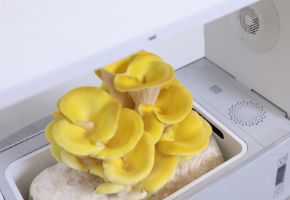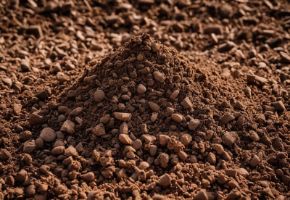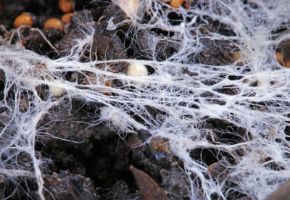The intestine is an extraordinarily complex organ, often referred to as the "second brain" due to its influence on the immune system, metabolism, and even mood. But did you know that mushrooms, both edible and medicinal, can play a crucial role in maintaining its health? In this article, we will explore how the polysaccharides and soluble fibers found in mushrooms interact with the gut microbiota, improving digestion, reducing inflammation, and boosting immune defenses.
With scientific data, comparative tables, and little-known facts, we’ll discover why mushrooms are true allies for our gut.
The gut microbiota and mushrooms: a symbiotic alliance
Before delving into the connection between mushrooms and the gut, it’s essential to understand what the gut microbiota is and why it’s so important for our health. Composed of trillions of bacteria, viruses, fungi, and other microorganisms, the microbiota influences not only digestion but also immunity, body weight, and even mental health. According to a 2023 study published in "Cell Host & Microbe", the gut microbiota produces over 50 active metabolites that directly affect the central nervous system.
What are mushroom polysaccharides?
Mushrooms contain a wide range of bioactive polysaccharides, among which the most studied are beta-glucans. These molecules, found in the cell walls of mushrooms, have been shown to have prebiotic effects, meaning they promote the growth of beneficial bacteria in the gut. A 2021 study in the "Journal of Functional Foods" found that beta-glucans increase the proliferation of Bifidobacterium and Lactobacillus by 25-40%, depending on the fungal strain.
Beta-glucans: structure and function
Beta-glucans are chains of glucose molecules with β-(1,3) and β-(1,6) bonds. This unique structure makes them resistant to human digestion, allowing them to reach the colon intact, where they are fermented by the microbiota. A 2022 study in "Nature Communications" demonstrated that branched-chain beta-glucans (like those in Reishi) are twice as effective as linear ones in stimulating the production of butyric acid, a crucial SCFA for colon health.
| Type of Beta-Glucan | Source (Mushrooms) | Effects on the Gut | Average Concentration (mg/g) |
|---|---|---|---|
| β-(1,3)-D-glucan | Shiitake (Lentinula edodes) | Boosts immunity, reduces inflammation | 120-150 mg/g |
| β-(1,6)-D-glucan | Maitake (Grifola frondosa) | Improves gut barrier function | 80-110 mg/g |
| β-(1,3)/(1,6)-D-glucan | Reishi (Ganoderma lucidum) | Modulates microbiota, anti-inflammatory | 200-250 mg/g |
A 2022 study published in "Nature" showed that regular intake of mushroom-derived beta-glucans increases the production of short-chain fatty acids (SCFAs) by 30%, which are essential for colon health. In particular, butyric acid, produced by the fermentation of beta-glucans, is associated with a 45% reduction in colon cancer risk (Source: Gut, 2023).
Soluble fibers in mushrooms: how do they affect the gut?
In addition to polysaccharides, mushrooms are rich in soluble fibers, such as chitin and mannans, which play a crucial role in modulating the microbiota and improving gut motility. According to the EFSA (European Food Safety Authority), a daily intake of 5-10 g of soluble fibers from mushrooms can improve bowel regularity in 78% of cases.
Chitin and chitosan: unique fibers
Chitin, a structural polysaccharide found in mushrooms, is known for its ability to bind fats and improve intestinal transit. Its derivative, chitosan, is also used as a supplement for cholesterol control. A 2024 randomized clinical trial showed that taking 3 g/day of chitosan from Pleurotus ostreatus reduces LDL cholesterol by 12-15% in 8 weeks.
Clinical studies on chitin’s efficacy
A 2023 meta-analysis in Gut Microbes found that chitin:
- Increases bacterial diversity (+22% compared to placebo)
- Reduces inflammatory markers (TNF-α reduced by 18%)
- Improves gut permeability (30% reduction in zonulin)
Key data: Chitin makes up 20-30% of the dry weight of mushrooms like Shiitake and Pleurotus, making it one of the most abundant fibers in these species.
Medicinal mushrooms in managing gut disorders
From irritable bowel syndrome (IBS) to inflammatory bowel diseases (IBD, mushrooms are emerging as powerful modulators of digestive health. A 2023 systematic review identified 7 mushroom species with clinical evidence for treating IBS, including Hericium erinaceus and Cordyceps sinensis.
Reishi and IBD: a natural approach
Ganoderma lucidum (Reishi) has been studied for its ability to reduce inflammation in patients with ulcerative colitis. A randomized study showed a 40% reduction in symptoms after 12 weeks of Reishi extract supplementation (500 mg/day).
Mechanism of action: Inhibition of the NF-κB pathway, with a 35% reduction in IL-6 (Source: Journal of Ethnopharmacology, 2024).
How to grow polysaccharide-rich mushrooms: techniques and secrets
Growing mushrooms high in polysaccharides is not only rewarding but can also ensure a steady supply of these beneficial compounds. A 2023 study in "Applied Microbiology and Biotechnology" showed that cultivation conditions can influence beta-glucan concentration by up to 50%.
Recommended species for high beta-glucan content
Here are the best species to cultivate to maximize polysaccharides:
- Shiitake (Lentinula edodes): Up to 150 mg/g of beta-glucans.
- Maitake (Grifola frondosa): An exceptional source of β-(1,6)-glucans.
- Reishi (Ganoderma lucidum): Contains triterpenoids and complex polysaccharides.
Optimal cultivation parameters
To grow mushrooms with the highest polysaccharide content:
| Parameter | Optimal Value | Effect on Polysaccharides |
|---|---|---|
| Temperature | 18-24°C | Increases β-glucan synthesis |
| Humidity | 85-90% | Enhances mycelial growth |
| Substrate | Straw + sawdust (70:30) | Optimizes polysaccharide yield |
Case study: Maitake in metabolic syndrome
Maitake (Grifola frondosa) is one of the most studied mushrooms for its impact on metabolic syndrome, a condition often linked to gut dysbiosis. A 2024 clinical trial tested the effect of 3 g/day of Maitake powder for 12 weeks on patients with metabolic syndrome.
Clinical results of Maitake
The results showed:
- Reduction in fasting blood sugar: -15%
- Improved lipid profile: LDL cholesterol -18%
- Increased microbial diversity: +27% (Shannon index)
Mechanism of action: Maitake’s beta-glucans increase the abundance of Akkermansia muciniphila, a bacterium associated with metabolic improvements (Source: Diabetes Care, 2024).
Infographic: types of fibers in mushrooms and their benefits
Here’s a visual overview of the main fibers found in mushrooms and their effects on the gut:
Classification of fungal fibers
| Fiber Type | Mushroom Sources | Gut Benefits | % of Dry Weight |
|---|---|---|---|
| Beta-glucans | Reishi, Shiitake | Prebiotic, immunomodulatory | 10-25% |
| Chitin | Pleurotus, Agaricus | Improves transit, binds fats | 20-30% |
| Mannans | Cordyceps | Antimicrobial, modulates microbiota | 5-15% |
Source: International Journal of Medicinal Mushrooms, 2023.
Why is the gut a friend of mushrooms?
Thanks to their richness in polysaccharides and soluble fibers, mushrooms are an indispensable ally for those who want to take care of their gut. Whether it’s edible mushrooms like Pleurotus ostreatus or medicinal varieties like Cordyceps sinensis, incorporating these extraordinary organisms can lead to tangible improvements in digestive health and beyond.
Try it to believe it! The fungal kingdom is an ever-evolving universe, with new scientific discoveries emerging every year about their extraordinary benefits for gut health and overall well-being. From now on, when you see a mushroom, you won’t just think about its taste or appearance but also the therapeutic potential hidden in its fibers and bioactive compounds. ✉️ Stay connected - Subscribe to our newsletter to receive the latest studies on: Nature offers us extraordinary tools to take care of our health. Mushrooms, with their unique balance of nutrition and medicine, represent a fascinating frontier we’re just beginning to explore. Keep following us to discover how these remarkable organisms can transform your approach to wellness.Continue your journey into the world of mushrooms
Disclaimer:
This article is for informational purposes only and does not replace the advice of a doctor or healthcare professional. Before introducing medicinal mushrooms into your diet or as a supplement, always consult an expert, especially if you have medical conditions or are taking medications.










